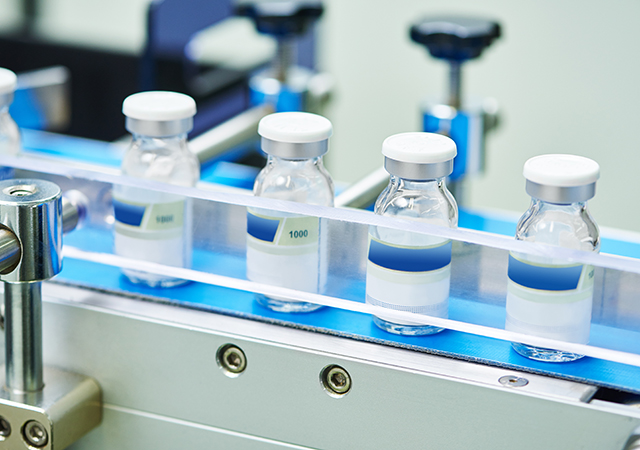
 Kadmy/Bigstock
Kadmy/Bigstock
Saudi Arabia has been making significant advancements in its pharmaceutical industry, leveraging technology, partnerships, and investment to drive growth and enhance its presence in the global market.
The Kingdom's pharmaceutical sector is the largest in the Middle East in terms of investment size. It encompasses around 30 percent of the region's total value. Currently, Saudi Arabia has 40 local factories in the pharmaceutical sector, covering 29 percent of the country's needs with revenue exceeding SR1.5 billion ($399 million), according to the National Industrial Development Center (NIDC).
The pharmaceutical market in Saudi Arabia is projected to reach SR56.6 billion in 2027, with a compound annual growth rate of 5.2 percent, stated Fitch Solutions, the research arm of US-based Fitch Ratings.
To further support the development of the local pharmaceutical industry, the Saudi government has implemented regulatory reforms and encouraged investment. These reforms aim to attract more investment and create a favorable environment for pharmaceutical companies.
The Saudi sovereign wealth fund has launched Lifera, a commercial-scale contract development and manufacturing organization. Lifera aims to boost the local biopharmaceutical industry by manufacturing essential pharmaceutical products such as insulins, vaccines, plasma therapeutics, monoclonal antibodies, cell and gene therapies, and innovative small molecules, according to BioPharma-Reporter.
Additionally, the Kingdom is investing in infrastructure and facilities to strengthen the pharmaceutical industry. The Saudi Authority for Industrial Cities and Technology Zones (MODON) has signed investment agreements to establish joint venture factories for vaccine manufacturing and research. Vaccine Industrial Company will establish a factory in Sadeer City to localize vaccine manufacturing and strengthen the pharmaceutical security system, reports Economy Middle East News.
Also, EVA Pharma, a rapidly growing pharmaceutical company in the Middle East and Africa, has acquired land in Sudair City to build a state-of-the-art research and manufacturing complex. This complex will enable EVA Pharma to produce a wide range of pharmaceutical products and respond to changing patient needs.
The Kingdom is also focusing on increasing local manufacturing of pharmaceutical products. NIDC has signed a memorandum of understanding with Jubail Pharma and RR Holding to boost local manufacturing of pharmaceutical chemical compounds. Furthermore, the National Unified Procurement Company (Nupco) has partnered with Sudair and Sanofi to start local insulin production, aiming to achieve self-sufficiency in strategically prioritized products.
In the digital transformation of the pharmaceutical sector, Google Cloud has partnered with Saudi Pharmaceutical Industries and Medical Appliances Corporation (SPIMACO) for a significant SAP ERP workload migration project. This project will enable SPIMACO to accelerate its digital transformation, support regulatory requirements, and position itself for future growth, revealed TahawulTech.
Also, one notable initiative is the collaboration between King Abdullah University of Science and Technology (KAUST) and amplifAI health. They are combining AI technology with hyperspectral imaging technology, known as Hyplex, to develop a new disease-detecting method. Initially, the focus is on detecting and managing diabetic foot complications, with a clinical trial planned.
This collaboration aims to detect diabetes early, develop better treatment protocols, and reduce the need for lower limb amputations. The application of KAUST technology to diabetic patients is expected to save the Kingdom over SAR2 billion annually in medical costs and reduce worldwide diabetic foot amputations.
Saudi pharmaceutical companies are also seeking to expand internationally. Avalon Pharmaceuticals, a rapidly growing Saudi Arabian pharmaceutical company, plans to increase its total exports from 10 per cent to 30 per cent by 2030. They will leverage their expertise in health and prescription medicine to target markets across the GCC and beyond.
Further, Saudi pharmaceutical companies are diversifying their product offerings. Avalon Pharma has partnered with AlUla Peregrina Trading to create premium cosmetic and dermatologic products based on science and natural patented AlUla Peregrina active ingredients. This partnership aims to produce exclusive products made in Saudi Arabia, focusing on hydration, anti-aging, and nourishment.
Overall, Saudi Arabia is making substantial progress in advancing its pharmaceutical industry through various initiatives, including technological collaborations, investment in infrastructure, localization of manufacturing, international expansion, and digital transformation. These efforts are expected to contribute to the growth and development of the industry, both domestically and internationally.
